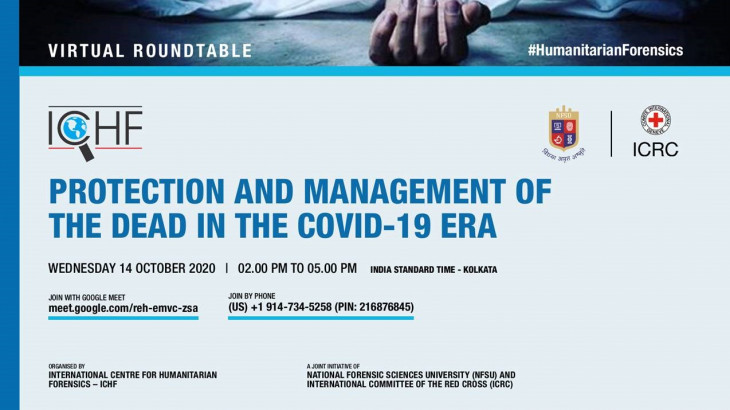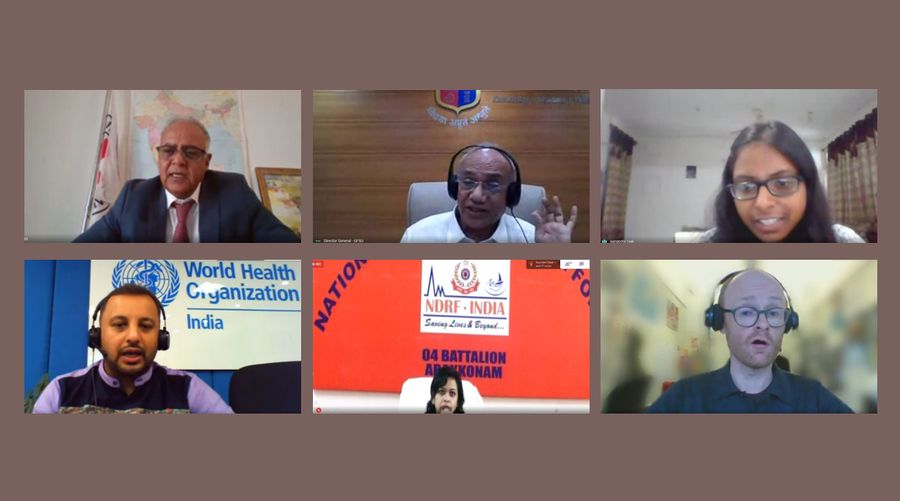Since the onset of the pandemic, numerous guidelines, protocols, and policies have been formulated and widely shared to safely and professionally manage the dead in a dignified manner. But many healthcare and deathcare workers – at the local, regional and national levels – are still struggling to implement the procedures and precautionary measures put in place. The International Centre of Humanitarian Forensics (ICHF) in India – a joint initiative of the ICRC and the National Forensic Sciences University (NFSU) in Gujarat, India – recently held a virtual roundtable with experts from the country’s leading health, disaster and emergency response agencies to address the challenges encountered in managing the dead with dignity.
The roundtable aimed to facilitate the operationalisation of existing policies and guidelines and to review their effectiveness. Forensic and non-forensic practitioners, academicians, and policymakers from the country’s leading health, forensic and emergency response institutions shared their COVID-19 experience in relation to dignified management of the dead and the difficulties and dilemmas faced during the past seven months.

Underscoring the pressing and unforeseen needs arising due to COVID-19, Yahia Alibi, Head of Regional Delegation, ICRC New Delhi, said in his keynote address, “This virtual discussion is a timely opportunity for all levels of government to come together to deliver a coherent approach to this humanitarian imperative. The ICRC stands ready to assist in those efforts with its forensic expertise.”
Dr JM Vyas, Vice Chancellor, NFSU, elucidated the extraordinary challenge of the current situation which, he said, differs from a regular disaster scenario where identification needs are paramount. He said, “There is a scare in society due to COVID-19. Sometimes bodies are left unclaimed in hospitals. This important and sensitive issue of dignity of the dead needs to be addressed while ensuring safety of those managing the dead.”
Across the world, owing to diverse reasons – lack of knowledge, misinterpretation of the guidelines, or the dissemination of misinformation – there have been several instances that have led to stigmatisation of frontline workers dealing with the COVID-19 crisis. In some cases, this has resulted in violence as well. This was reaffirmed by Rekha Nambiar, Commandant, National Disaster Response Force, (NDRF), who said, “In addition to widespread ignorance, stigmatisation in relation to COVID-19 deaths has been our first-hand experience. We believe existing policies are comprehensive if effectively implemented and adapted.”
Ensuring that healthcare and deathcare workers are safe and able to carry out their jobs is crucial for their protection and indeed to ensure the continuing care of people affected by the disease. Highlighting the need to rope in community leaders from all major faiths to sensitize the masses, Prof Sangeeta Taak, Head of the Centre for Advance Studies in International Humanitarian Law (CASH), Rajiv Gandhi National University of Law, Patiala, said, “it is important to protect the families’ right to grieve and bid farewell as they undergo extraordinarily traumatic experiences during this humanitarian crisis.”
Explaining the ICRC’s support to create awareness on this subject, Oran Finegan, ICRC Head of Forensics, said, “We have worked hard to develop COVID-19 messaging for communities to dispel myths surrounding the dead and the risks associated. This is one of the first platforms that is looking into lessons learnt – which will be key going forward.”
Offering a scientific perspective to the evolving situation and necessary precautionary measures, Dr Aseem Bhatnagar, Deputy Director, Institute of Nuclear Medicine & Allied Sciences (INMAS), Defense Research Development Organization, stated, “Providing reliable information – during a time when conflicting and confusing messaging is happening – is vital to ensure maximum compliance with safety measures.”
Prof. Sasikala, Head of the Department of Forensic Medicine & Toxicology at the Government Medical College, Trivandrum, Kerala outlined the protocols for the proper management of COVID-19 related deaths in Kerala, emphasizing “the importance of local coordination to efficiently manage the dead when space, in particular, to properly store unidentified or unclaimed bodies is a growing concern”.
Reinforcing the ICRC’s message that containing COVID-19 requires a larger collective effort globally and at regional and country level, Saurabh Dalal, representing World Health Organization (WHO), said, “In these months, COVID-19 has taught us that we need long-term cooperation of stakeholders in government, scientific community, religious groups, civil society and communities to achieve a balance between public health, culture, behavior and practice.”
The ICRC regional delegation in New Delhi continues to collaborate with experts from leading think tanks and centres of excellence across India on focused thematic discussions to foreground the needs of communities that have been impacted the most by COVID-19 as well as on global policy issues to find solutions to mitigate the long-term humanitarian consequences of the pandemic.


